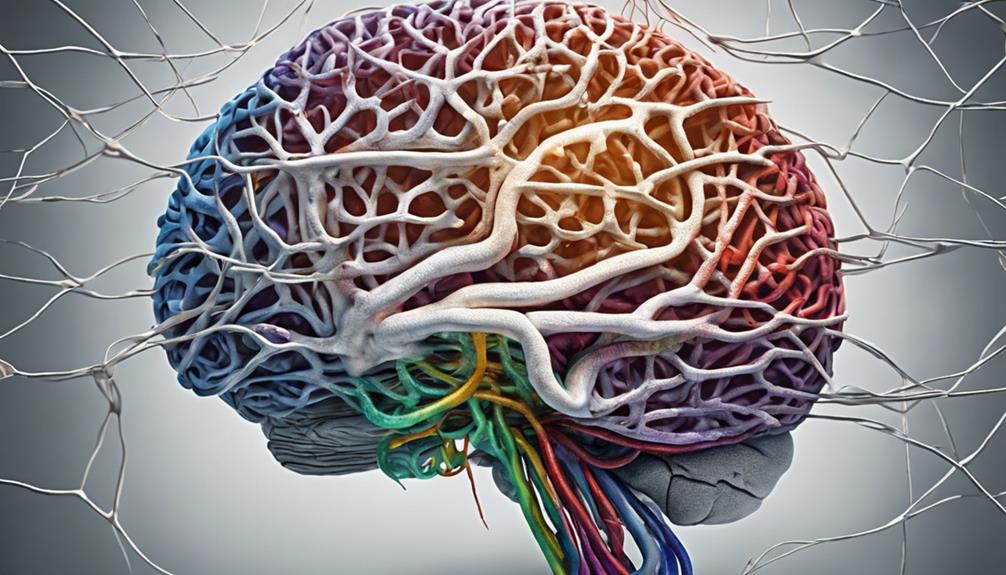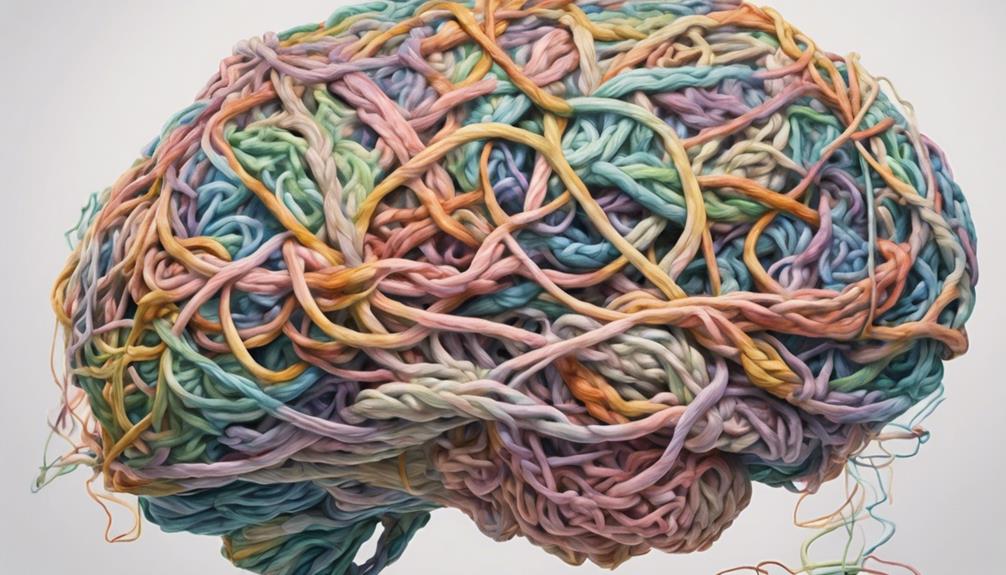As we delve into the difficult journey of healing from post-narcissistic abuse, we uncover the intricate web of changes in the brain that happen as a result of enduring this trauma.
The aftermath of manipulation and gaslighting can linger, leaving a lasting imprint on our cognitive processes and emotional resilience.
Understanding how these experiences shape our neural pathways is a crucial step towards reclaiming our sense of self and fostering healing.
Stay tuned for insights into the transformative journey of recovery and the remarkable capacity of the human brain to adapt and thrive amidst adversity.
Key Takeaways
- Emotional abuse from narcissists can lead to brain changes affecting memory and emotional responses.
- Recovery from narcissistic abuse is a complex, non-linear process that requires time and professional support.
- Trauma from narcissistic abuse can overactivate the amygdala, causing chronic anxiety, but the brain can adapt through neuroplasticity.
- Avoiding retraumatization and practicing self-compassion are crucial for healing from narcissistic abuse.
Impact of Narcissistic Abuse on the Brain
Frequently, emotional abuse inflicted by narcissists can result in profound alterations to the brain's functioning and structure. The constant manipulation, gaslighting, and invalidation can trigger significant changes in how the brain processes information and regulates emotions.
Victims may experience heightened levels of stress, anxiety, and hypervigilance, impacting their overall well-being. This type of trauma can lead to an overactivation of the amygdala, the brain's fear center, causing persistent feelings of fear and unease.
Understanding these brain changes is crucial in comprehending the lasting impact of narcissistic abuse on an individual's mental health. By recognizing the neurological effects of emotional abuse, we can better support and empathize with those who've endured such trauma.
Neuroplasticity and Healing Trauma

Understanding the concept of neuroplasticity sheds light on the profound process of healing from the lasting trauma inflicted by narcissistic abuse on the brain. Neuroplasticity refers to the brain's ability to reorganize itself by forming new neural connections, allowing for recovery from traumatic experiences. This transformative process enables individuals to reshape their responses to triggers associated with past abuse, fostering healing and resilience. Below is a table illustrating the key aspects of neuroplasticity in healing trauma:
| Neuroplasticity in Healing Trauma | Description |
|---|---|
| Formation of new neural connections | Brain adapts to create healthier responses to trauma. |
| Rewiring of neural pathways | Enables individuals to change ingrained patterns of thought and behavior. |
| Healing through exposure therapy | Gradual exposure to triggers aids in desensitization and recovery. |
| Importance of consistent therapy | Regular therapeutic interventions support lasting neuroplastic changes. |
| Self-care practices for neuroplasticity | Mindfulness, meditation, and self-reflection enhance healing processes. |
Emotional Responses and Brain Changes
How do emotional responses to narcissistic abuse impact the brain's neuroplasticity and healing process?
Emotional trauma from narcissistic abuse can significantly affect the brain, leading to changes in emotional regulation and responses. The amygdala, responsible for processing emotions, can become hyperactive, causing heightened anxiety and fear responses. These repeated patterns of emotional distress can shape the brain's neural pathways, reinforcing negative thought patterns and emotional reactions.
However, through neuroplasticity, the brain can rewire itself over time with proper support and healing practices. By addressing emotional responses to abuse, individuals can gradually shift towards healthier coping mechanisms and emotional regulation, promoting long-term healing and recovery from the effects of narcissistic abuse.
Factors Influencing Recovery Process

The recovery process from narcissistic abuse is influenced by various factors such as the duration and intensity of the abusive relationship, the presence of a supportive network, and the individual's mental well-being.
The length of time exposed to abuse can impact the healing journey, with long-term abuse potentially creating deeper wounds. Having a strong support system can provide comfort and validation, aiding in the rebuilding of self-esteem and trust.
Mental health plays a crucial role, as pre-existing conditions or trauma can complicate recovery. Factors like self-awareness, resilience, and willingness to seek help also contribute to the healing process.
Understanding these influences can empower survivors to navigate their recovery path with self-compassion and determination.
Types of Narcissistic Abuse Tactics
Various insidious tactics are employed by narcissists to manipulate and control their victims, leaving them feeling confused, insecure, and emotionally drained.
Gaslighting is a common tactic used to erode self-esteem and make victims question their reality, leading to self-doubt and emotional distress.
Threats of harm, whether directed at the victim or others, can instill fear and anxiety, creating a sense of powerlessness.
Narcissists may also engage in sabotage, undermining the victim's efforts and achievements to maintain control over them.
Additionally, financial, physical, and sexual abuse are forms of manipulation used by narcissists to assert dominance and further exploit their victims.
Understanding these tactics is crucial in recognizing and addressing narcissistic abuse for healing and recovery.
Professional Support in Healing

Navigating the journey of healing from narcissistic abuse often involves seeking professional support to facilitate recovery and growth. Therapists specializing in trauma can provide a safe space to process emotions, develop coping strategies, and reframe negative beliefs. They help in rebuilding self-esteem, setting healthy boundaries, and fostering self-compassion.
Psychologists or counselors can guide individuals in understanding the dynamics of narcissistic abuse, offering validation and support crucial for healing. Support groups led by experienced facilitators allow survivors to connect with others who've had similar experiences, reducing feelings of isolation and providing a sense of community.
Seeking professional help is a vital step towards reclaiming one's life and finding empowerment after enduring narcissistic abuse.
Boundaries and Self-Compassion in Recovery

In the process of healing from narcissistic abuse, establishing firm boundaries and practicing self-compassion are crucial steps towards reclaiming personal empowerment and fostering emotional well-being. Setting boundaries is essential to protect oneself from further harm and regain a sense of control. Self-compassion involves treating oneself with kindness and understanding, counteracting the negative self-talk often instilled by the narcissistic abuser.
| Boundaries | Self-Compassion |
|---|---|
| Protect from further harm | Counteract negative self-talk |
| Regain sense of control | Treat oneself with kindness |
| Establish personal limits | Understand and validate emotions |
Frequently Asked Questions
Can Brain Changes From Narcissistic Abuse Be Reversed Through Therapy and Healing Practices?
Absolutely, brain changes from narcissistic abuse can be reversed through therapy and healing practices. Therapy helps in rewiring neural pathways, promoting emotional regulation and new coping mechanisms.
Engaging in healing practices like mindfulness, self-care, and boundary setting aids in recovery. Professional support offers tools to navigate trauma responses, fostering healing and growth.
With dedication and support, it's possible to overcome the impacts of narcissistic abuse on the brain.
How Does Narcissistic Abuse Affect the Brain's Ability to Trust and Form New Relationships?
When facing narcissistic abuse, our brain's ability to trust and form new relationships can be profoundly impacted. This abuse can instill deep-seated doubts, creating barriers to trust and vulnerability.
Forming new connections may feel daunting, as past trauma lingers, affecting our perceptions and interactions. Overcoming these challenges requires patience, self-compassion, and, often, professional support to navigate the complexities of rebuilding trust and fostering healthy relationships.
Are There Specific Techniques or Therapies That Can Help Rewire the Brain After Enduring Narcissistic Abuse?
Absolutely!
When it comes to rewiring the brain after enduring narcissistic abuse, specific techniques and therapies can play a vital role. By addressing trauma through therapies like cognitive behavioral therapy (CBT), eye movement desensitization and reprocessing (EMDR), and mindfulness practices, individuals can begin to rewire ingrained patterns and responses.
These approaches offer valuable tools for rebuilding trust, enhancing self-esteem, and fostering healthier relationship dynamics post-abuse.
Can the Effects of Narcissistic Abuse on the Brain Impact Physical Health and Well-Being in the Long Term?
Absolutely, the impact of narcissistic abuse on the brain can have long-term consequences on physical health and well-being. The chronic stress and emotional trauma inflicted by narcissists can manifest in various physical ailments over time.
From increased risk of cardiovascular issues to compromised immune function, the toll on our bodies is significant. Understanding these connections is crucial in promoting holistic healing and recovery from such damaging experiences.
How Do Cultural and Societal Factors Play a Role in the Recovery Process From Narcissistic Abuse on a Neurological Level?
Cultural and societal factors significantly impact recovery from narcissistic abuse on a neurological level. Support systems, beliefs about mental health, and access to resources influence healing.
Stigma around seeking help or prioritizing mental well-being can hinder progress. Understanding how cultural norms shape perceptions of abuse and trauma is crucial for effective recovery.
Our community's response to survivors plays a vital role in promoting resilience and fostering a safe environment for healing.
How Does Narcissistic Mirroring Affect Brain Changes and Recovery After Narcissistic Abuse?
Narcissistic mirroring in manipulation can lead to significant brain changes and hinder recovery after narcissistic abuse. The constant validation and idealization provided through mirroring can create a distorted self-perception and make it difficult for victims to regain a sense of self-worth and autonomy after the abuse ends.
Conclusion
In conclusion, as we navigate the complexities of brain changes and recovery after narcissistic abuse, it's essential to acknowledge that healing is a gradual and nonlinear process.
While some may question the effectiveness of professional support in this journey, it's important to recognize the invaluable role that therapy and counseling play in facilitating healing and growth.
By embracing self-compassion, setting boundaries, and seeking professional guidance, we can embark on a path towards resilience and restoration.










